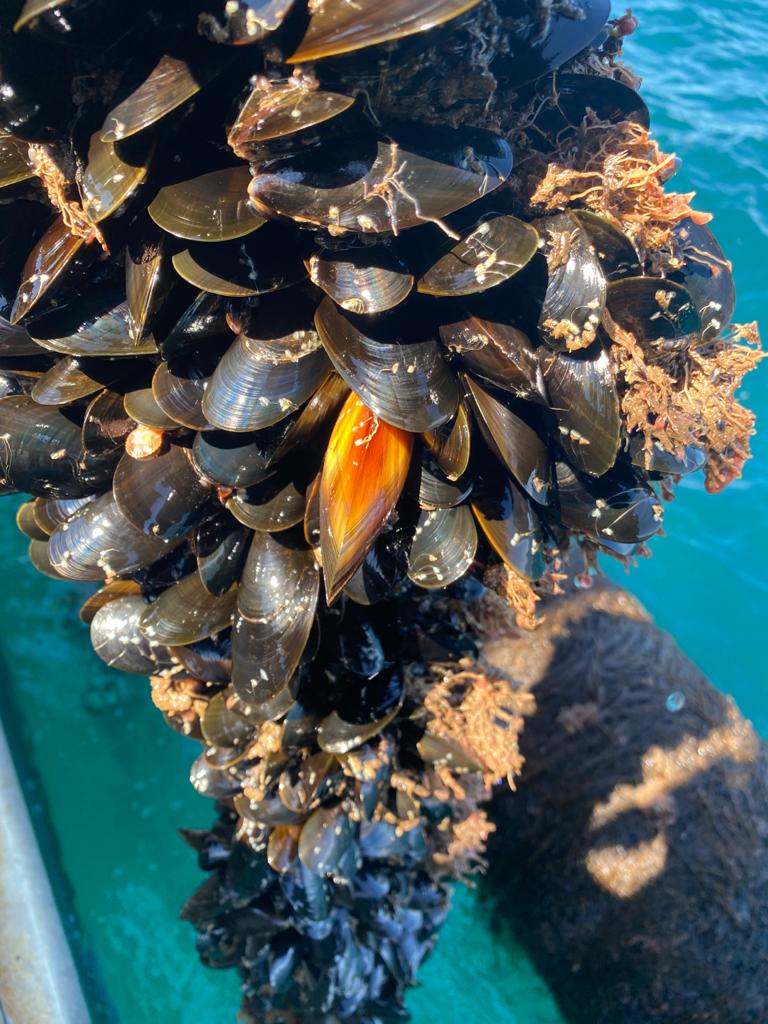Offshore Shellfish
Contact
““The true meaning of sustainable is that you can keep doing it more and more and more, and you’re still having no harm on anything. That’s sustainable.”
John Holmyard, MD and Founder, Offshore Shellfish

Offshore Shellfish Ltd is a family-run company running an offshore, rope cultured mussel farm for the native blue mussel, Mytilus edulis. Once complete, the farm will be largest of its kind in European waters, with capacity to grow more than 10,000 tonnes of mussels per year. The farm is situated in open water, between 3 and 6 miles out to sea in Lyme Bay, Devon. It is well-placed to take advantage of the ideal growing conditions present in the English Channel.
Custom-made ropes, suspended from longlines in continuous loops, collect naturally occurring wild mussel larvae, which settle as microscopic ‘spat’ during late spring. After the spat has grown for a few months, it is stripped from the ropes, washed, graded and seeded onto new ropes at the ideal density using a wrapping of biodegradable cotton. The reseeded ropes are hung back in the water, where the mussels are left to grow to market size.
Mussel farming requires no inputs of feed, chemicals or medications. Offshore Shellfish Ltd is committed improving the marine habitat, becoming the first mussel farm in Europe to attain Best Aquaculture Practise (BAP) certification from the Global Seafood Alliance. It is also certified by the ASC (Aquaculture Stewardship Council) and as an organic aquaculture farm by the Soil Association.
Working with the University of Plymouth, Offshore Shellfish has evidenced an increase in biodiversity, productivity and species richness within the farm. Offshore farms can contribute to improving the quality and clarity of our waters once again. Mussels can also permanently lock up large amounts of carbon, as their shells are formed of calcium carbonate.
Read more about the company here.
Revenue Model
Sales of mussels to customers across the UK and the European Union
Public/Grant Funding
European Maritime and Fisheries Fund funding for one stage of development.
Legal Arrangements
Seabed lease from the Crown Estate and hold a Marine Management Organisation licence for the build. Registered as an aquaculture business with the Fish Health Inspectorate. Sites classified as a shellfish harvesting area with the Food Standards Agency. Location of sites registered with the hydrographic office and included on Admiralty charts.
Parties Involved
Accreditation through the ASC (Aquaculture Stewardship Council), Global Seafood Alliance Best Aquaculture Practices, and the Soil Association. Collaboration with Plymouth University to monitor the impact of the farm on the marine ecosystem and sponsorship of studentships.
Environmental Improvement
The rope farm creates variety of new habitats, food and nursery areas for fishes and invertebrates.
Permanent carbon sequestration through the locking up of atmospheric and oceanic carbon into the mussel’s Calcium Carbonate shells.
Improved water quality an clarity due to the filtering action of mussels. Each individual mussel is estimated to filter 42 litres of seawater each day.
Social Impact and Engagement
Provision of a sustainably farmed and nutritious food source. Creation of 20 skilled jobs in an economically depressed coastal area. All sea-going crew undergo extensive mandatory training to ensure the safe operation of vessels and equipment and the delivery of a quality food product.
By also acting as a fish nursery, the rope farm also likely benefits local fish stocks and therefore the local fishing industry.
Register your project for the 2024 Nature Finance Review
"*" indicates required fields
Out of date? Contact us at info@ecosystemsknowledge.net